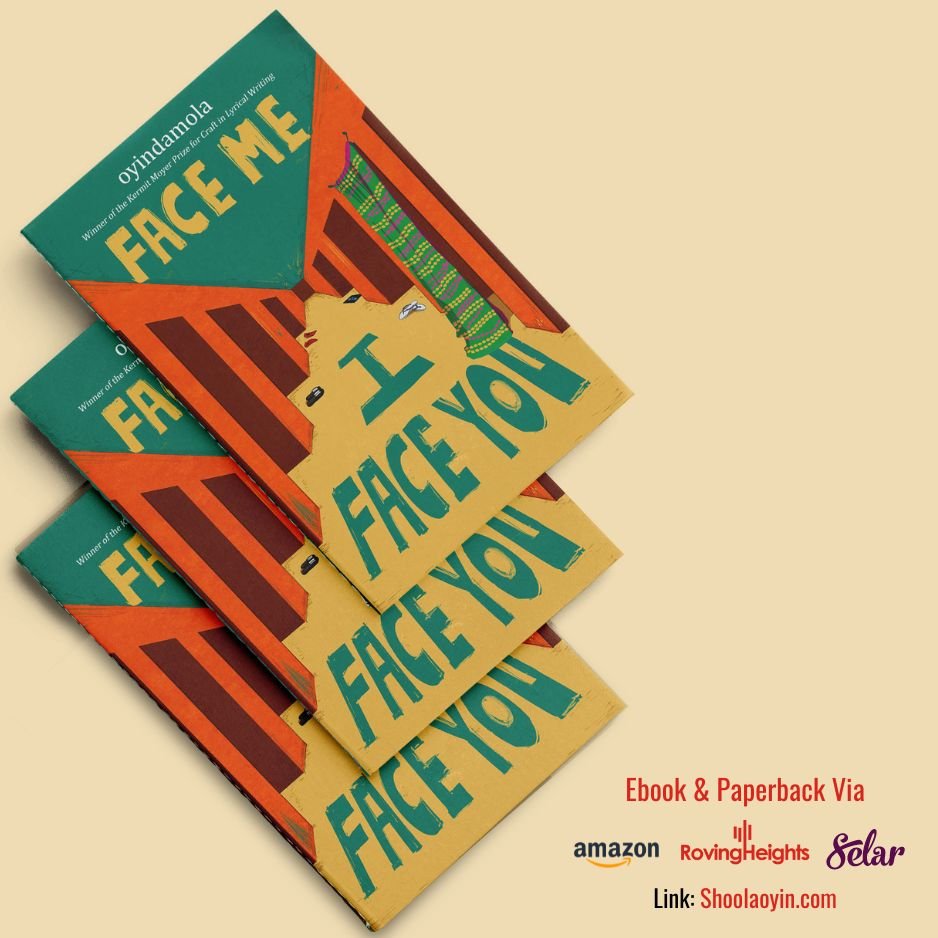Face Me I Face You by Oyindamola: Redefining Poetry with Simplicity and Humour
By Ilerioluwa Olatunde
I once wrote about my love-hate relationship with poetry, but over time, I've grown to appreciate poetry thanks to a generation of poets who have embraced simplicity. Their work has made poetry more accessible and enjoyable, inspiring readers to see poetry as a genre worth exploring and savouring. Since discovering these poets, I have also become fascinated by how they use poetry to tell stories—challenging the view of poetry as abstract or overly conceptual and proving that it can be both engaging and narrative-driven. Among them is Oyindamola, whose work I have come to appreciate deeply. Unsurprisingly, her circle includes Tolu Akinyemi, also known as Poetolu, whose witty style makes him a standout in this new generation of poets.
Face Me I Face You is Oyindamola's latest masterpiece. If you've enjoyed her previous books or looked forward to her captivating poems on Instagram every Saturday, this poetry anthology will be no exception. However, for those just discovering Oyindamola, you're in for a treat—her writing and creative brilliance will undoubtedly win you over.
The first thing that stands out in Oyindamola’s book is her clear intention to create a memorable experience for all readers—whether they love or hate poetry. The book cover, with its bold fonts, catchy illustration, unique title, and her name subtly placed in the corner, made me smile. I was like, this can only be Oyindamola! It also reminded me of a blog post where she shared her conversation with Poetolu about his writing and creative process. She wrote, “If your priority as a writer is to get your reader’s attention, then you must consider using catchy and unique titles.” She described a book title as the appetiser, main course, and dessert, emphasising that it should serve the purpose of inviting readers. Titles, according to her, should serve a purpose beyond mere decoration.
Oyindamola’s intentionality shines through in every aspect of her book, demonstrating that we are in the hands of a writer who truly knows her craft and how to capture the attention of both book lovers and sceptics. Reflecting on her second book, To Bee a Honey, she shared how people suggested using bees and honey in the cover art. However, she felt strongly that the cover should represent, not repeat, the title and content. To her, a cover design shouldn't just look like what you would expect from a poetry book—it should stand out. The cover design of Face Me I Face You offers a visual representation that perfectly complements the narrative within.
Face Me I Face You is a prose poetry collection in which Oyindamola masterfully blends storytelling with poetry, delivering a sensational experience for readers. The book is divided into three parts: Palava, Face Me I Face You, and Water & Garri, each exploring themes of family, identity, love, culture, class, religion, and the everyday drama accompanying shared spaces. I particularly appreciate the thoughtful introductions to each section, which provide insights into the themes explored.
One of the standout techniques in Oyindamola’s book is character development. She skillfully crafts her characters, painting vivid images in readers' minds before revealing the events surrounding them. What sets Face Me I Face You apart is how the characters come to life, each with distinct voices and authentic experiences. Oyindamola imbues her characters with purpose and depth, enabling readers to envision their lives and connect with them. I particularly enjoyed the brief descriptions that precede each character's narrative. Additionally, Oyindamola effectively employs code-mixing in her stories, seamlessly integrating traditional names, local phrases, slang, myths, and cultural elements that further enhance the characters' authenticity and relatability.
Oyindamola’s storytelling is marked by a unique perspective that distinguishes her work. She once shared that as writers and thinkers, it's crucial to continually ask ourselves: what’s the perspective that everyone else is missing but is important? This philosophy resonates throughout her poetry, where she draws inspiration from everyday experiences, transforming the average drama in a shared apartment and family setting into compelling art.
The first part, Palava, sets the tone for this poetry collection by exploring family dynamics across two generations from the narrator's perspective. Through Oyindamola's witty and engaging verse, we encounter relatable characters like Aunty Sola, who has a sharp tongue and a knack for minding everyone’s business but hers; Maami, who reminds us that a mother’s raised eyebrow or side-eye can convey messages far more powerful than words; Mama Sade, the fervent prayer warrior whose loud prayers disturb the peace, while tirelessly attempting to curb Baba Sade's philandering; and Sade, who goes to great lengths to keep her man, only to end up heartbroken. I found myself laughing out loud in this section, but Sade’s prayer in “Father” and the vivid imagery of her lifting holy hands remain particularly memorable. On a deeper level, it reminds us how our prayers can sometimes attribute personalities to God He does not possess.
“MY FATHER!!!
Make me your Bureau de Change!
Sade shouted at the altar,
praying after the service.
FATHER! Maldives will look good on my skin,
and let my melanin pop like Otedola’s pikin.
FATHER! Relocate me to Canada,
and let my backyard be America…” (Page 25)
Another poem I enjoyed in this section is “A Naija Christmas,” which beautifully evokes memories of childhood Christmas celebrations. However, it’s also a bittersweet reflection on how much things have changed over the years. The titles of each poem scream creativity and intentionality, perfectly representing the content within. My favourite title is “A Visitor from Hell,” which truly captures Aunty Sola's character!
In the second part, the poems bring to life the humour of a face-me-I-face-you living arrangement, where neighbours become an unavoidable part of your daily existence. There is even an architectural illustration that maps out an average shared apartment, showing each character's room. We reunite with the same narrator from Palava, who has finally moved out of her father's house, but the drama and gossip continue unabated. This section reminded me of the sitcom “Face to Face” from my childhood, and I couldn’t help but hum the theme song.
In this part of the book, we meet Delilah, a sex worker “whose skirt will never be enough to cover her black yansh.” In “Delilah Took My Breath Away,” her breath may literally take your breath away. We also encounter BroDa Samson, the hypocrite who flaunts his religious practices while engaging in extracurricular activities with Delilah. The biblical reference to Samson and Delilah adds irony, as BroDa Samson's moral failings mirror those of the biblical figure. Then there's Bimpe, the single-pringle introvert whose mantra is "666"—six-pack abs, six-figure income, and six feet tall. Her ideal husband must possess a Canadian passport, a British accent, and an American bank account; anyone lacking these qualities isn’t worth her time.
The final part, Water & Garri, explores the bond between the narrator and her lover. The love and vulnerability they share will leave you feeling love-struck and awed. While I hesitate to call this section the climax of this anthology since the earlier sections made me laugh intensively, this part certainly stands out. In “Love at First Sight,” Oyindamola illustrates how bonds can form unexpectedly, playfully suggesting that when a man asks for your number, you should respond with, “Bank account or phone number?”
The poem “Love Doesn’t Cost a Dime” sparks a thought-provoking conversation about love and the culture of bride price. Here, Oyindamola describes cultural norms that equate love with material wealth and extravagant gestures, portraying the societal expectations placed on men as both overwhelming and absurd. She skillfully employs hyperbole, vivid imagery, and satire to convey her message while referencing cultural and historical contexts. This approach paints a familiar mental picture, making the poem relatable and prompting deeper reflection. “You’ll Know It is Love” will resonate with anyone who has once fallen deeply in love.
To conclude this anthology, Oyindamola delivers an emotional rendition titled “Breaking Up with the Moon.” Through vivid imagery and metaphor, the poem reflects the bittersweet transition from childhood's simplicity to adulthood's complexities. It is a gentle reminder that before we became preoccupied with fitness goals, relationship status, and adult pursuits, we were once children “riding through the night, thinking the moon ran with us.”
The poems in this collection are light, playful, and rich with humour, making the book memorable. Oyindamola's writing is simple yet funny, bringing everyday themes to life in a way that makes it easy to visualise the characters and their antics. The vibrant illustrations complement her storytelling, making the characters leap off the page and enhancing the reading experience. The narration in the anthology is detailed. Her conversational tone makes her poetry inviting, while her use of humour, nostalgia, and cultural references keeps readers engaged. The rich imagery celebrates Nigerian culture and communal living with relatable characters and familiar scenes.
One of the most refreshing aspects of Oyindamola’s work is its simplicity. You won't have to struggle to understand her words, as she intentionally rebels against the traditional complexity of poetry. Her clear and direct language makes this anthology about family, love, and the fragility of relationships in communal spaces easy to understand and enjoyable to read. Additionally, the flow of her writing is seamless, ensuring that you remain captivated until the very last page. Oyindamola has a gift of taking readers on a journey and bringing them home, leaving you wondering, "Is that all?" because the experience feels effortless and immersive.
This collection reads like a series of short stories, each brilliantly capturing the chaos of communal living with just the right touch of love. Oyindamola’s ability to turn everyday events into readable and intriguing narratives demonstrates her mastery of storytelling. Her relatable and humorous portrayal of everyday experiences not only made me laugh but also made me feel connected. This is a book I thoroughly enjoyed, and poets like Oyindamola offer hope for the revival of poetry - with poets like her, many who hate poetry may find themselves falling in love with it again.
During an interview with Afrihill Press, when she was asked about her favourite poem by another poet while mentioning her recent favourite anthologies, she noted that these anthologies align with and inspire what she aims to achieve with her recent poems: a shared simplicity, relatability, and humour about the commonalities of life. Indeed, Face Me I Face You embodies these qualities, capturing everyday experiences with warmth, wit, and a deep sense of familiarity. Oyindamola is a poet who not only understands her craft but also knows how to push the boundaries of poetry, using unconventional ways to tell a story.
Biography
Ilerioluwa Olatunde is a creative writer and book reviewer interested in fiction, creative nonfiction, and performance poetry. She recently tried her hands at business writing and finds it amusing. She is a fellow of Sprinng and Speakin' Fingers Academy. Her work, which focuses on book reviews, lifestyle, and the human condition, has been published on platforms such as Sprinng and Shuzia. She draws inspiration from the books she reads, societal and economic issues, her personal life, and her relationship with God.
She is also an Economic Research Analyst and enjoys volunteering. When she is not writing, she reads, listens to music, has fun in her head, or does research.

